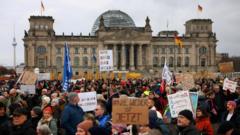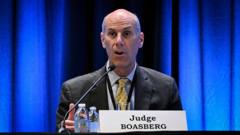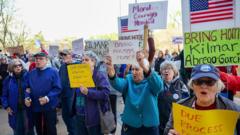In a show of solidarity against far-right influence in national politics, approximately 160,000 protesters gathered in Berlin, highlighting deep concerns over recent collaborations with the Alternative for Germany (AfD) party.
Massive Protests Erupt in Berlin Against Far-Right Politics

Massive Protests Erupt in Berlin Against Far-Right Politics
Tens of thousands rally in the German capital, voicing concerns over political shifts and the rise of the AfD party.
Around 160,000 protesters took to the streets of Berlin this past Sunday to oppose what they consider a significant shift toward compromise with far-right politics. The demonstrations erupted following a controversial vote where parties, including the Christian Democratic Union (CDU), chose to align with the AfD on a non-binding immigration resolution last week, an act many viewed as a violation of Germany's post-war political taboo against engaging with extremist groups.
The protests come just weeks ahead of national elections and echo similar gatherings across Germany. They began near the Bundestag, Germany's parliament, before moving towards the CDU headquarters. Protester Anna Schwarz, 34, expressed that this was her first political rally, emphasizing the urgency to demand that political leaders uphold democracy: "We can no longer avert our gaze," she stated.
The CDU currently holds a leading position in the polls for the upcoming snap elections while the AfD stands in second. Despite the rising tensions, CDU leader Friedrich Merz has ruled out any coalition with the far-right party. However, last week, the parliament debated a non-binding motion on immigration changes that, although it passed, saw a later proposal to reduce immigration rejected with scant margin, showcasing the balancing act between appeasing hardline supporters and maintaining traditional party values.
The approach taken by Merz has drawn considerable criticism, including from former chancellor Angela Merkel, who admonished her successor for straying from the CDU’s long-held commitments not to engage with the AfD. Merz countered these allegations, asserting that the merits of policy decisions remain true regardless of the parties that may support them, stating, "A right decision doesn't become wrong just because the wrong people agree to it."



















